If you’re looking to get in shape for the summer, consider taking our 30-day summer body challenge, which will help you tone up your musculature and feel better overall.
The results will show up within 30 days, as long as you are consistent with your training and have a good nutrition plan.
Usually, with conventional strength training, it will take you more than 30 days to actually achieve a visible change in your body.
However, with the exercises that we have gathered in this challenge, you will be able to target every muscle group in your body and progressively overload with it.
Exercises, rep ranges and rest times change with each day of the challenge, to help you further adapt your musculature to new and different stress.
The challenge
Below, you can see a table with all exercises and sets and reps accordingly.Exercise showcase and explanation is below the table itself.
| Day | Exercises |
|---|---|
| 1 | 50 sit ups, 2 sets Plank- 1 minute each |
| 2 | 100 sit ups, 2 sets Plank- 1 minute each |
| 3 | 50 burpees, 50 leg pull ins |
| 4 | 200 sit ups |
| 5 | 100 Jump squats, 50 Russian twists on each side |
| 6 | 50 squats, 50 Supermans |
| 7 | Plank- 3 minutes total, 50 jumping jacks |
| 8 | 50 glute bent leg kickbacks, 100 leg pull ins |
| 9 | 70 squats, 100 sit ups |
| 10 | 100 jumping squats, 150 leg pull ins |
| 11 | 50 push-ups, 50 parallel bar dips |
| 12 | 20 pull ups, 40 bench triceps dips |
| 13 | 3 minutes plank, 80 squats, 50 rear lunges |
| 14 | Rest day, stretching exercises |
| 15 | 80 push ups, 60 parallel bar dips |
| 16 | 150 sit ups |
| 17 | 40 pull ups, 40 bench triceps dips, 150 sit ups |
| 18 | 150 jumping squats, 100 bent leg kickbacks, 200 leg pull ins |
| 19 | Rest day, stretching |
| 20 | 120 push ups, 65 parallel bar dips |
| 21 | 50 pull-ups, 250 leg pull ins |
| 22 | 100 rear lunges, 100 jumping squats |
| 23 | Rest day, stretching |
| 24 | 100 burpees, 200 sit ups |
| 25 | 60 pull ups, 60 push ups, 5 minutes plank |
| 26 | 150 jumping squats, 120 bent leg kickbacks, 150 rear lunges |
| 27 | 150 push ups |
| 28 | 100 pull ups |
| 29 | 250 jumping squats, 150 bent leg kickbacks |
| 30 | 5x50m sprints, 200 push ups, 250 leg pull ins |
Sit up
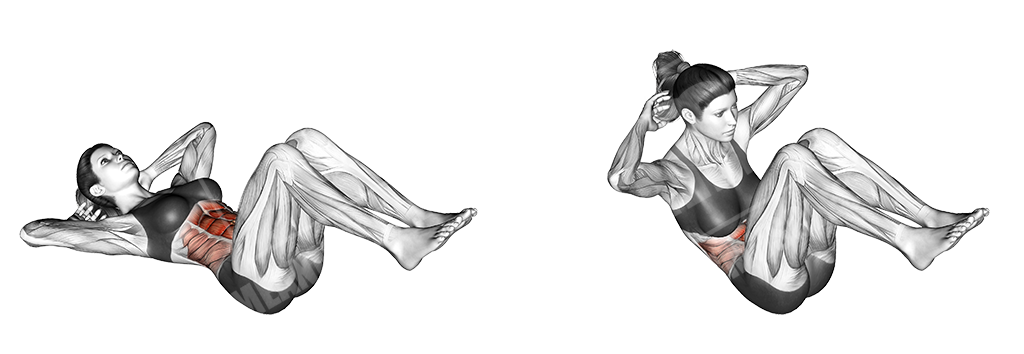

This is an exercise that engages the abdominal, as they stabilize the whole movement.
Execution
- Lay down with your knees bent and legs off the floor.
- Place your hands behind your head, then go up, contracting your abs.
- Hold the contraction for a split second, then go down.
Important note
To keep constant tension on your abs, avoid completely laying down in-between the repetitions.
Plank
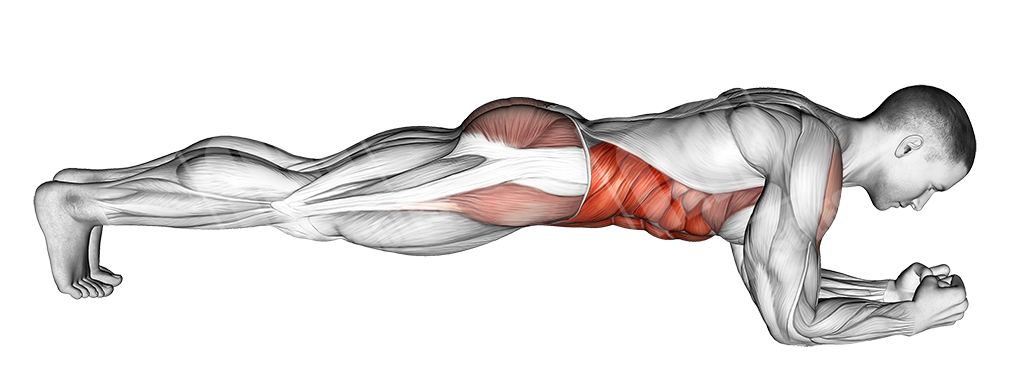

This is a stability exercise, controlled by the midsection.
Execution
Stand on your toes and elbows, with your legs straight and hold that position for as long as required.
Burpees
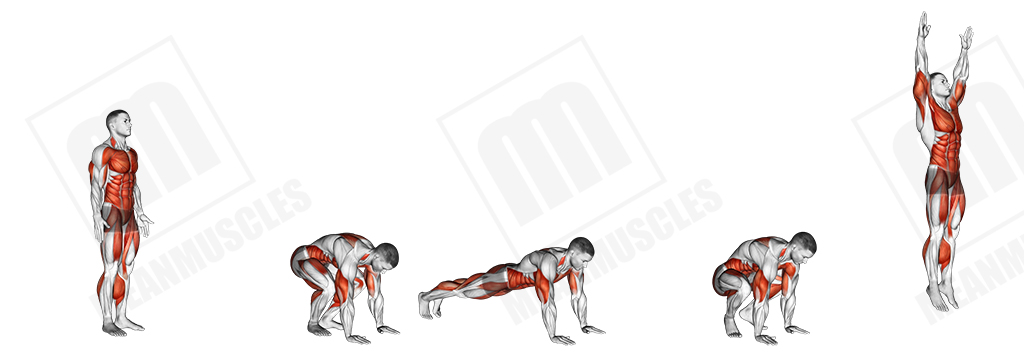

This is one of the most effective body-weight exercises, that is cardio oriented, but also develops pushing and jumping strength, explosiveness and endurance.
This exercise targets most of the musculature as well as the cardio-vascular system.
The movement itself it a fast-paced movement with cardio character, that also works on pushing, jumping strength along with explosiveness and endurance
Execution
- Stand up with your arms by the sides of your body
- Squat down, reaching for the ground with your arms, to get into a push-up position
- Place your arms wider than shoulder width
- Do a whole push-up, then return to the squatting position
- Do an explosive jump squat, extending your arms
- Repeat
Leg pull in
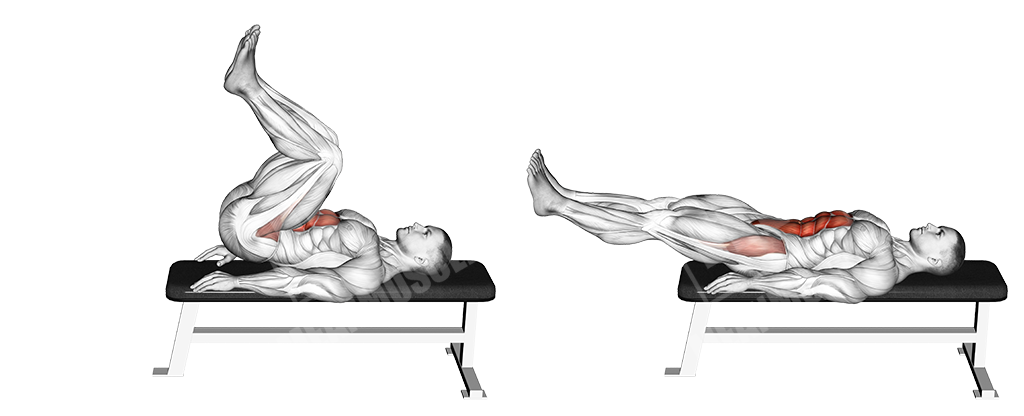

This is an exercise that targets the abs. It can be done on the ground or a flat bench.
Execution
- Lay down and keep your hands by your side.
- Keep your legs straight and off of the floor.
- Pull your legs in, contracting the abdominals, then return to the initial position.
Sissy Squats
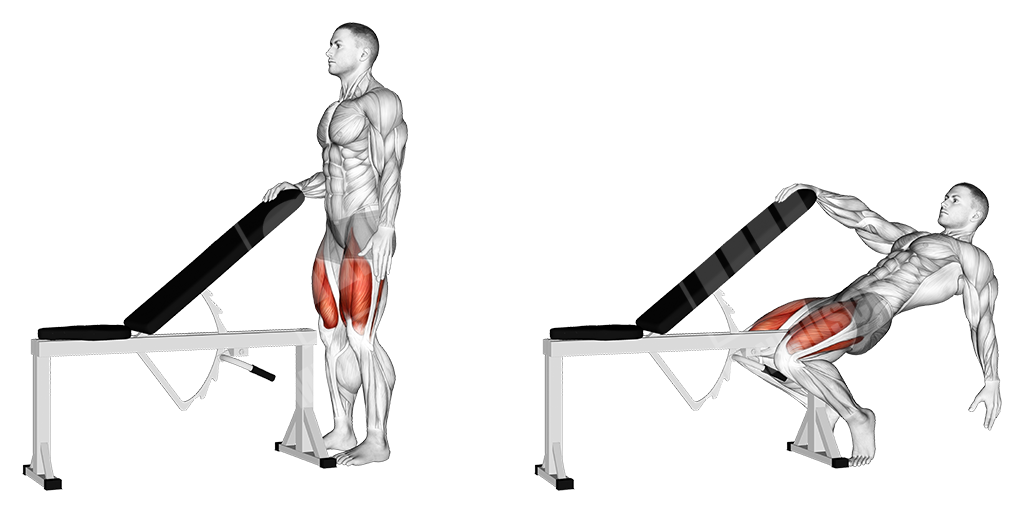

Execution:
- Stand up with your legs close to one another
- Hold on to something with one of your arms to have greater balance
- Lift your heels slightly off the ground
- Let your knees go forward and back down
- Keep the tension on the quadriceps and feel how they are stretching out
- Get back to initial position without locking out the knees
Note:
This is a totally different exercise, compared to conventional squats, and is mainly used to stretch the legs out.
Keep a moderate pace, as an explosive movement might lead to knee damage.
Russian twist
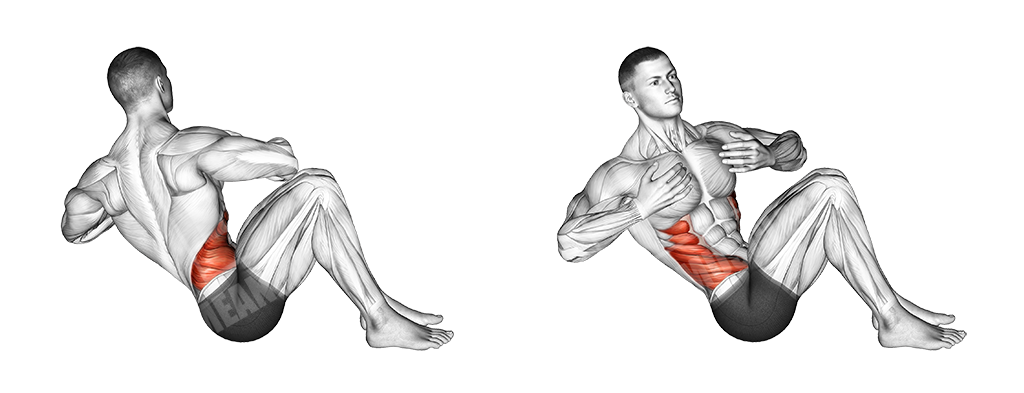

This is an exercise that primarily targets the obliques. It can either be done with bodyweight, or a medicine ball for more tension.
Execution
- Sit down with your legs tucked in and your torso at a 45-degree angle.
- Keep your hands/hold the medicine ball at chest level.
- Keep your core tensed in order to keep balance.
- Twist to the side, contracting the side of your abdominal (obliques), then repeat on the opposite side.
Body-Weight Squats
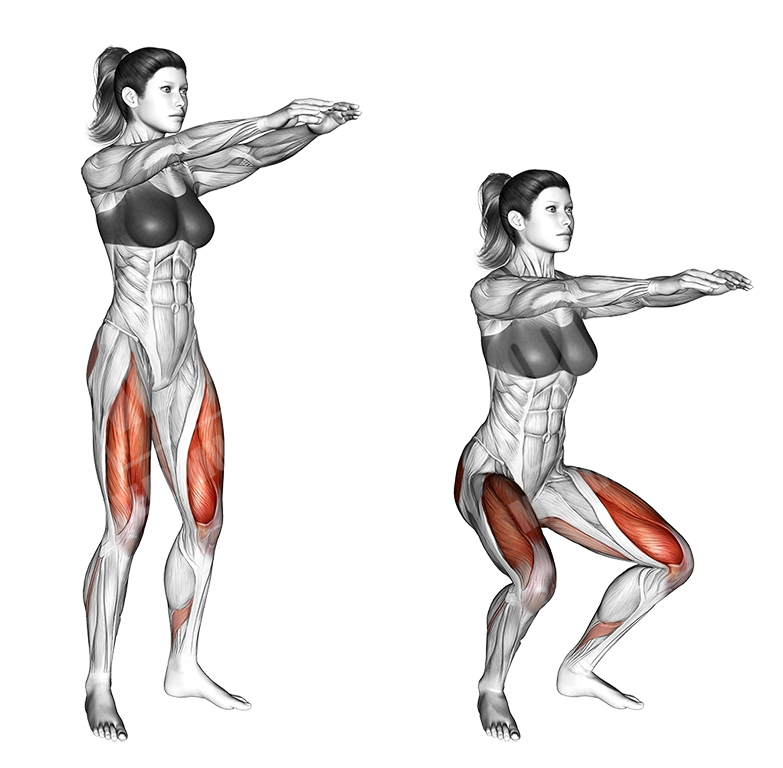

Execution
- Stand up with your arms extended forward
- Keep your feet at shoulder width
- Open your toes slightly, so that they are pointing outward and not forward
- Keep your knees slightly bent, without locking them out
- Keep your torso straight
- Let your butt go down until the point, where your hamstrings are parallel to the ground
- Squat up, without locking the knees
Possible tweaks
- If you get into a wider stance- more tension goes to the glutes
- Contract glutes at the top to emphasize on them
Superman


This exercise targets the glutes, hamstrings and spinal erectors.
Execution
- Lay face down and extend your arms forward.
- Keep your knees slightly bent, so that they are not locked out.
- Keep your head up and then reach up with your arms and legs simultaneously, contracting the hamstrings, glutes and lower back.
Jumping Jacks
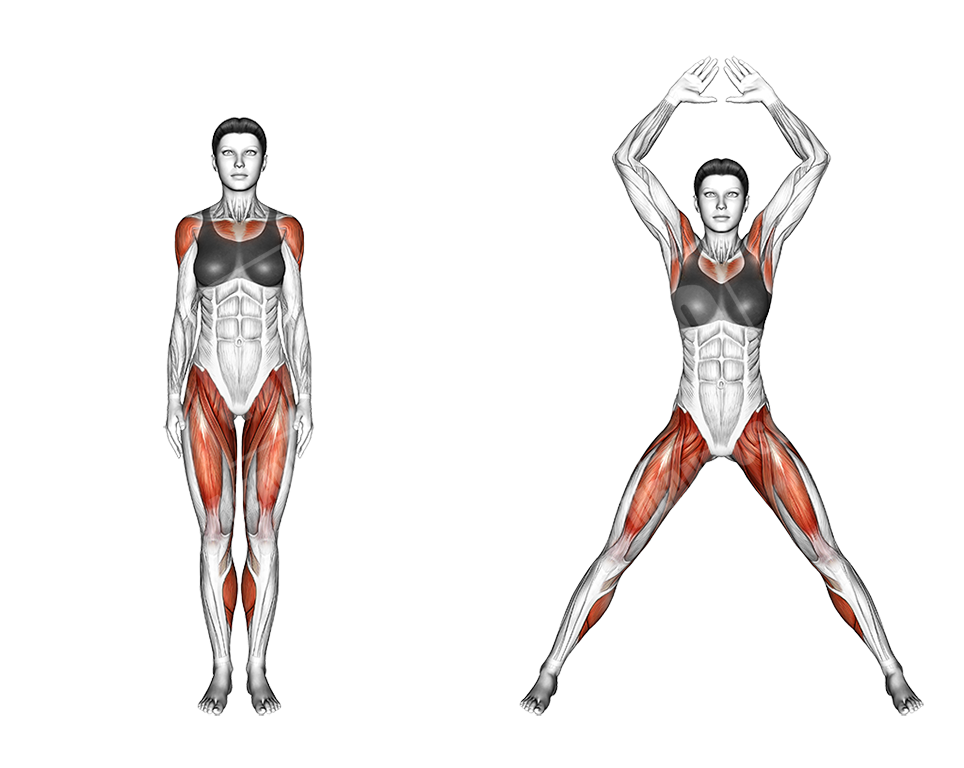

This exercise engages the quads, calves and shoulders.
Execution
- Stand up straight with your hands by your side and heels close to one another.
- Jump up, getting your hands closer to one another and legs further respectively.
Bent Leg Kickback


This is a glute isolating exercise.
Execution
- Get down on your hands and knees.
- Keep your back straight and head up.
- Lift your right leg off of the floor and slightly bend the knee.
- Kick back with your leg contracting the glutes.
Bench Dips
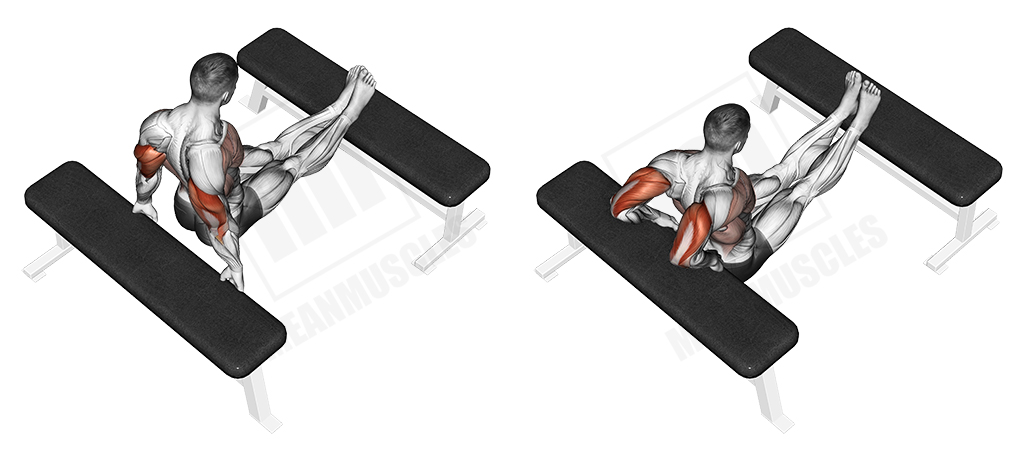

This exercise primarily targets the triceps, and secondarily, the chest.
Execution
- Sit on the side of a bench and place your hands beside you
- Lift your body up in the air, by only keeping balance on your hands
- If you have never done bench dips, start off with your legs on the ground, without lifting them up on another bench as illustrated
- Let your body down until the upper portion of the arm is parallel to the ground
- Push yourself up to the initial position, slowly locking out the elbow to achieve greater triceps contraction
Important notes
- Neck reflexes – Look up to emphasize on the triceps
- Injury prevention – Do not quickly lock out your elbows at the top, to avoid joint damage
- Control the movement and feel your triceps/chest/shoulders working
Parallel Bar Dips
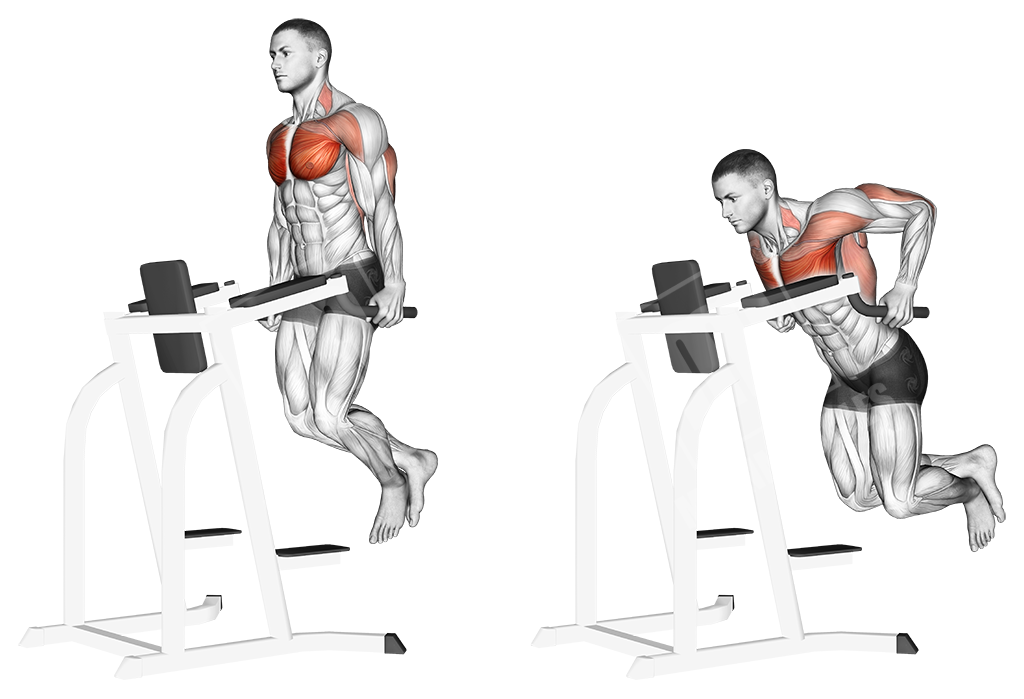

This exercise is mainly used to target the chest and triceps.
It is one of the basic exercises, which you should not ignore if you want to develop actual, functional pushing strength, which will also lead to better development of the chest and triceps musculature.
To best engage the chest musculature, we need to have a wide grip and keep our elbows slightly open, as the triceps gets involved more if the elbows are closer to the body.
Execution:
- Grab the parallel bar and get up on it, as illustrated in the first picture.
- Keep your body straight, without hunching your back
- Cross your legs as illustrated
- Let your body go down, until the point where your upper portion of the arm is parallel to the ground.
- Push yourself up to the starting position
Important notes
- Neck reflexes- When trying to target the chest, keep your head down.
- If you look up, you will cause the triceps musculature to engage more in the movement.
- Try not to swing your body during the movement and keep a moderate pace.
- Do not lock out the elbows
Push-Ups
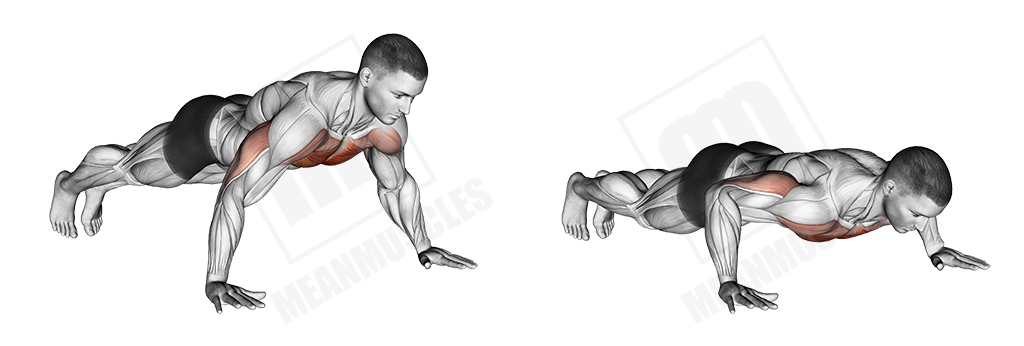

Muscle groups involved: Chest, triceps, front deltoids
Targeted muscle groups according to arm placement
- Wide hand placement mostly targets chest
- Regular (shoulder) width placement- Engages chest primarily, while the front deltoids and triceps musculature are secondarily involved
- Close arm placement (Diamond push-ups) – Primarily engage the triceps, while the front deltoids and chest are secondarily involved.
This is a great pushing exercise that yields great results around the shoulder line, shaping up the pectoral, as well as the shoulder and triceps musculature.
The movement is biomechanically close to the conventional bench press exercises which you can do in a gym, meaning that push-ups are a great substitute for those exercises.
By changing the angle of the exercise (e.g- place your legs higher) you can engage different portions of the pectoral musculature and/or increase/decrease tension and ease the movement.
Changing the arm placement to a wider or closer one, will lead to more chest/triceps engagement respectively.
Execution of the exercise:
- Get into a push up position, where your hands are placed slightly below shoulder line and fingers point forward.
- Keep your heels together and look forward- In the initial position, the body is straight and the elbows are slightly bent- do not lock them out.
- Go down slowly to the point where your chest touches the floor
- Push up explosively to the initial position, without locking out the elbows.
Pull Ups
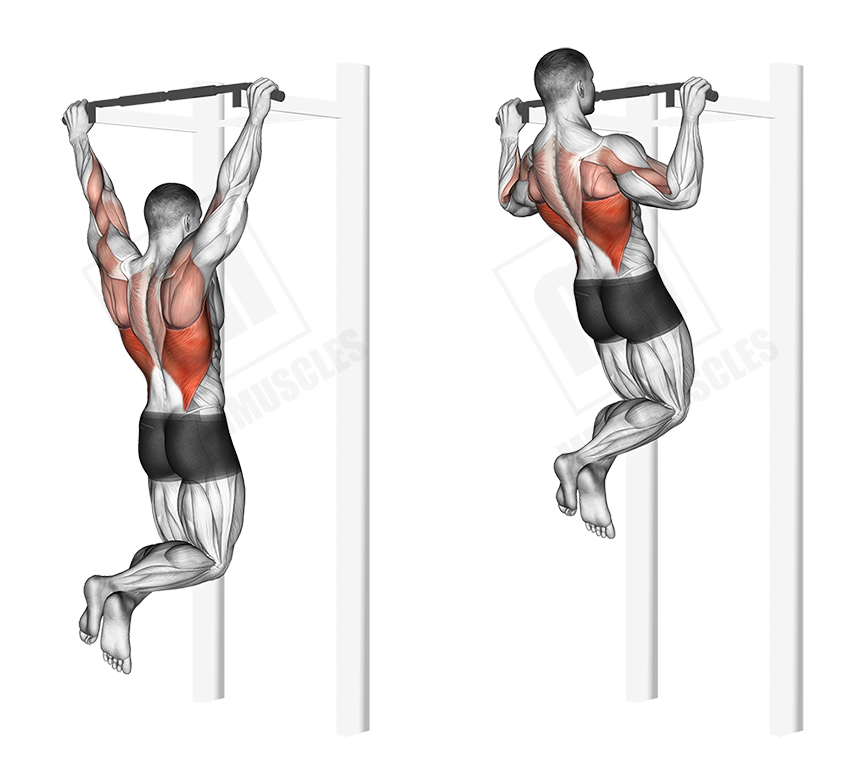

Grip: Overhand grip, wider than shoulder width
Execution:
- Get into the pull up position where you grab the pull up bar, with a wide, overhand grip and are in a dead hanging position.
- Pull yourself up until your nose/chin reach the bar, then hold the position for 1 second.
- Let your body down completely to the original, dead hanging position and stretch out the back as much as possible before you proceed to the next repetition
Body-Weight Rear Lunge
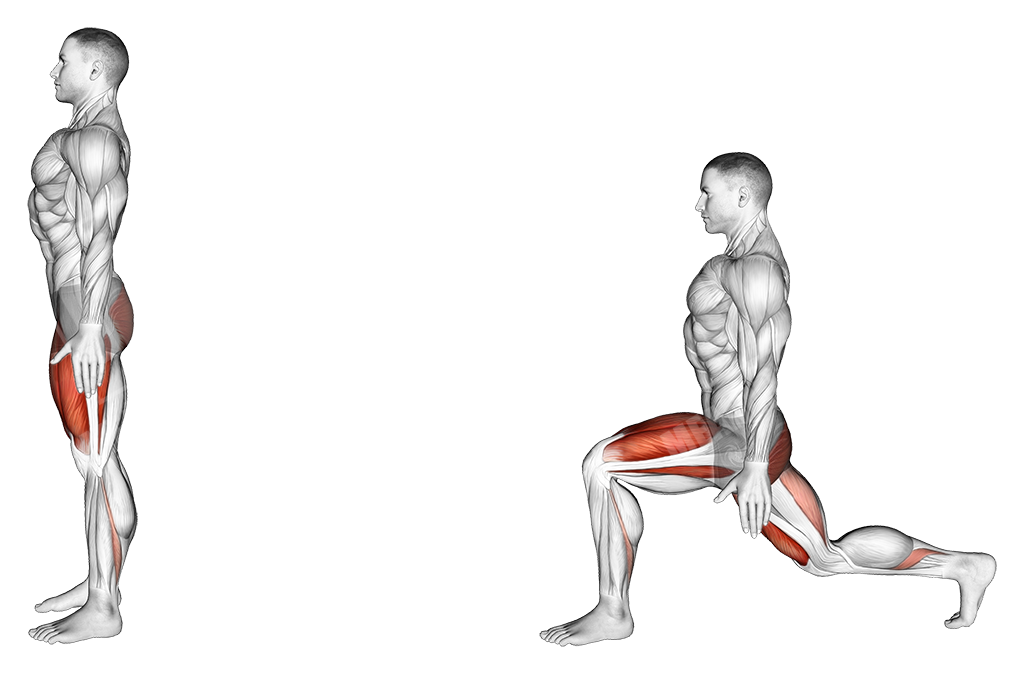

Execution
- Stand up straight with your hands by your side and feet placed at shoulder width.
- Keep your back and body straight, then let your left leg go back, stepping on your toes.
- Let the body go down and then return to the initial position and repeat the movement on the opposite leg.
Important note
To avoid knee injury, be careful not to hit the ground with it.
Stretching exercises
If you have trouble picking stretching exercises for those rest days, check out our Stretching methods and techniques article and Stretching exercises section, where you can find information about the benefits and types of stretching.
The stretching exercises during the rest days, will help you recover from the volume-heavy workouts during the 30-day challenge.
Stretching exercises are not of stressing, but rather relaxing character, so they can be included after the workouts as well.
Let us know how your body composition has changed after completing this challenge!


